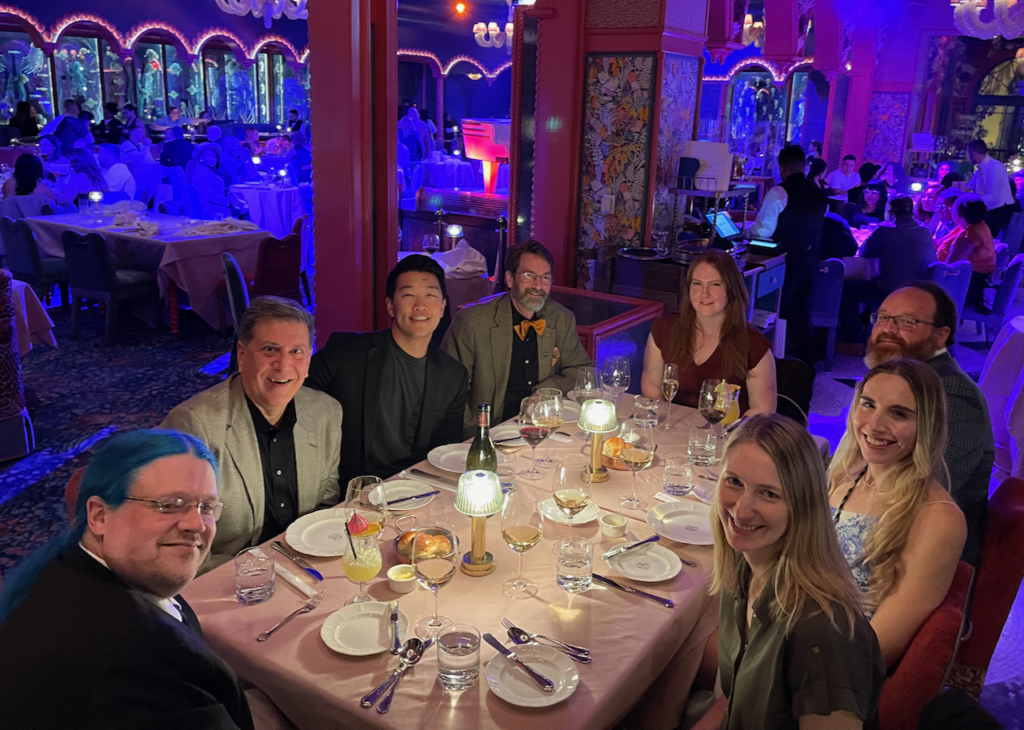Today marks my second anniversary as an AWS employee. Time flies and I’m still having a lot of fun.
After I sold the company I founded in 2019 and parted ways two years later, I wasn’t sure what I wanted to do. I’ve often joked that I enjoy working in open source and in network monitoring so much that I would do it for free, so I still wanted to keep working (although probably not so much with the “free” part). When my friend Spot Callaway told me about an open source opportunity at AWS, I was intrigued. After meeting the amazing people I would be working with, I was eager to survive the AWS interview process (called “The Loop“) and join the team.
I wasn’t sure I would be comfortable at a company with roughly 100,000 times the employees of my small venture, but I find that I really enjoy how AWS is structured. There is a philosophy that teams at Amazon should never be bigger than one that can be fed with two pizzas (“two pizza” teams) and so you feel a lot of autonomy. There is also this idea of “two-way” vs. “one-way” doors. Decisions that can be reversed, i.e. “two-way doors”, can be made quickly and at a lower level, whereas decisions that can’t be reversed require more thought and a higher level approval. The team I’m on, the Open Source Strategy and Marketing team (OSSM “awesome”) is amazing, and the closest I’ve ever come to experiencing imposter syndrome has been working with this group of incredible people (and remember kiddos, it’s not imposter syndrome if you are an actual imposter).
Recently, Michael Coté posted a link on Mastodon to an article written back in 2018 by Luke Kanies on “Why We Hate Working for Big Companies“. Outside of Amazon I’ve only worked for one big company, and that was Northern Telecom. A lot of what he writes about really reflected on my experience at NORTEL, but not so much my experience at AWS. Even though AWS has a hierarchical management structure, in practice it seems very flat to me. I’ve always felt that I have access to my skip-level VP, and Amazon has a culture of escalation so that issues can be resolved quickly. I personally have a lot of autonomy to decide how to best implement our team and corporate goals, and I don’t feel that there is some sort of “central planning organization” dictating what I do.
The late, great Anthony Bourdain once talked about the reason he is did his television show was for the access. He simply didn’t have an easier way to get the experiences he wanted outside of it. I like that, in my role at AWS, I get to work with the organizations that in many ways form the heart of modern open source software, such as the Apache Software Foundation and the Linux Foundation. I get to step up my open source game and grow as a person.
But the main reason I like my job is that I get to work with some amazing customers. I like to think that AWS is the best place for companies, especially startups, to run their cloud workloads, and while that may not be true for everyone it is my goal to help make it true. Prior to our acquisition we were an AWS shop and that was mainly because AWS made it easy for us to get started with using the cloud. I literally get paid to meet with these companies that in many cases are defining their market with innovative products and to help them be successful.
It’s a lot of fun.
These days, especially in technology, nothing is certain, but my plan is to keep working at AWS until I retire at age 65. My hope is that I’ll continue in my current role but there are so many opportunities at AWS that I can explore new things as well. My friend William Hurley has gotten me interested in quantum computing, and Amazon is doing some foundational work in that field with Amazon Braket. I’m still skeptical about the hype around Generative AI but the tools I get to play with at AWS have been more powerful than the other things I’ve tried.
For example, I have a group of friends who get together once a week for lunch. One of them meant to write that this week it was at “my abode” but somehow that got autocorrected to “mime abides”. The image that popped into my head was of Jeff Bridges in his role in “The Big Lebowsky” but dressed as a mime. I wanted to create that picture so I tried it on a couple of GenAI image services and they came up short. I decided to try it on AWS and not only did I get an image I could use, I could send my prompt to a number of different models with just one click and choose the best one.
Yeah – it’s definitely not perfect and I am no “prompt engineer” but to be able to create this quickly and easily served my purpose to make my joke.
When I am asked in interviews what is your biggest weakness, my answer is that I can’t handle a job that requires a lot of rote and repetitive work. I thrive in constantly changing environments, and I am grateful that my job at AWS is such a match for my temperament, and many thanks to my teammates for creating such a great environment in which to grow.

